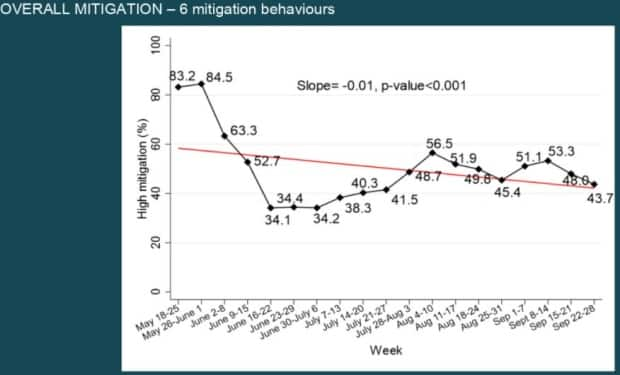Study author alarmed only 56 per cent of Sask. respondents plan to get COVID-19 vaccine
The author of a major COVID-19 study says he's alarmed only half of Saskatchewan people who took part said they plan to take a vaccine once it becomes available.
"It's distressing," University of Saskatchewan epidemiologist Nazeem Muhajarine said.
"This signifies a failure of public health people and politicians to communicate very clearly that the vaccine is going to be safe."
Muhajarine said it's one of several troubling findings in the sweeping survey by the Saskatchewan Population Health and Evaluation Research Unit (SPHERU). He and others have collected more than 5,000 responses at regular intervals since the start of the pandemic this spring on a range of topics. Muhajarine agreed to share the results with CBC News this week.

Muhajarine said he's worried by only 56 per cent of respondents saying they plan to get vaccinated. He's also worried the trend is going in the wrong direction. Support has been dropping since May, when 85 per cent of respondents said they would get it.
Muhajarine said the reasons are unclear, but he suspects social media conspiracy theories played some role. Some may also be feeling a false sense of security, since the death toll has been lower so far in Saskatchewan than other jurisdictions, he said.
Muhajarine said he and his family will definitely be getting the vaccine as soon as it's available.
"We want to be protected, but we also want to contribute to that collective protection we call herd immunity," he said.
The survey also asked residents about the level of risk they are taking. On the other hand, it also asked about their levels of safety or "mitigation" behaviours.

People are taking more risks, he said. The percentage of respondents who engaged in "high risk" visits outside the home in a given week has more than doubled to 76 per cent this fall from 35 per cent in May.
The number of people who said they regularly practised basic safety measures such as hand washing, physical distancing and staying home if sick was at 83 per cent in May. That dropped to 44 per cent in September, according to the survey.
"There's some COVID fatigue. They might be getting tired of the hand washing and everything. With the numbers we are now seeing, there are concerns," Muhajarine said.
Muhajarine said the one bright spot was masking. Nearly 60 per cent of respondents say they now mask, compared with 40 per cent in May. He said this matches the results of another question: 63 per cent of respondents say masks should be mandatory in all indoor spaces, with just 11 per cent against any mask use.

He noted the recent outbreaks stemming from religious services and bars all occurred when large groups congregated in small indoor spaces without masks.
Muhajarine said public health officials, politicians and community leaders of all kinds must communicate the importance of remaining vigilant. He said that's the easiest way to prevent cases, hospitalizations and deaths from rising.
However, Muhajarine fears things will have to get much worse before some people start to care. With a record 427 active cases in Saskatchewan as of Tuesday, Muhajarine said that day may not be far away.


